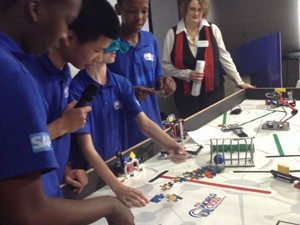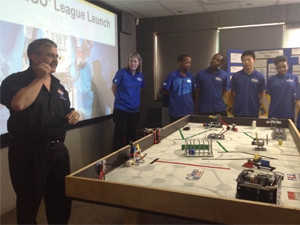
SAP South Africa has given a R1.4 million cheque to the First Lego League (FLL) SA, a programme that introduces young students to real-world engineering challenges by building Lego-based robots to complete tasks on a thematic playing surface.
The cheque was handed over to Johannes de Vries, operational partner of the FLL in SA, at the SAP offices in Johannesburg last week by SAP chief operating officer Derek Kudsee.
The programme is an international robotics team competition for children aged nine to 16, which has been designed to introduce children to the real world of engineering challenges by developing their ability to work in teams and teaching them creative problem-solving.
"Building technological literacy in the youth is key; learning is not only about the classroom and books, it is about truly grasping the concept of whatever subject you are learning," says Kudsee.
"The First Lego League is an initiative that drives the practical understanding of technology and innovation from an early age, inspiring a love of science, technology, engineering and maths," he adds. "Scientists, mathematicians and innovators are a driving force behind the success of any country, and SAP Africa is at the forefront of creating the environments which encourage this."
According to Paul Stapelberg, programme manager at SAP Africa, one of the main reasons SAP sponsors the programme is because the company wants to invest in the youth - so they can get into science and technology careers.
"The programme is very IT-oriented, scientific and mathematical, therefore some of the children who participate in the programme are potential employees for SAP," says Stapelberg.
"Through the company's support of the FLL, which introduces young people to the fun and excitement of science and technology, SAP helps to provide the much-needed funding, mentorship, time, talent and the equipment to bring the vision of the FLL to life," said SAP in a statement.

Stapelberg points out children who participate in the programme learn life skills - for example, programming, public speaking, presentation, computer work, team work and research. The students will be able to use those skills to excel at school and carry them to adulthood, he adds.
A team of learners from the German International School in Johannesburg gave the audience a taste of what the competition entails with a live demonstration of a robot made mostly from Lego. The robot was built and programmed by the students using sensors, motors and processors, and it navigated a pre-set course to complete different tasks.
"In a world where everything is about science and technology, this programme will be advantageous to the children," says Stapelberg. "We have found most schools concentrate on physical activities for post-curriculum activities, but not all kids are sporty."
The league gives children who do not excel at sports something to compete in, says Stapelberg. "Most kids who are not good at sport are good at FLL; it tests your skills in an intelligent way but it's also competitive."
More details are available on the First Lego League Web site.
Share